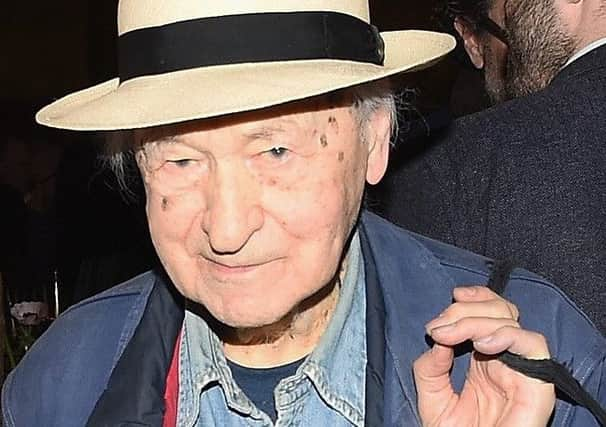Jonas Mekas


Mekas, who survived a Nazi labour camp and years as a refugee, died on Wednesday at his home, said the Anthology Film Archives. Mekas was artistic director of the New York-based non-profit theatre, a leading avant-garde cinema and centre for film preservation.
Weighted by the scars of wartime Europe, energised by post-war America, he was at the centre of an historic era for the avant-garde and befriended such celebrities as Jacqueline Kennedy, John Lennon and Andy Warhol. He published poetry and memoirs, made hundreds of films and videos, wrote an influential column for the Village Voice and opened the Anthology Film Archives, where a young Martin Scorsese was a frequent attendee.
Advertisement
Hide AdAdvertisement
Hide Ad“There isn’t one word, or even a dozen, to characterise the breadth of Jonas Mekas’s achievement,” critic J Hoberman wrote in 2012.
Scorsese, director John Waters and actor James Franco were among his admirers, and, although he never approached mainstream popularity, his friends and collaborators included some of the most important artists of his time. On Wednesday, filmmaker Jim Jarmusch called Mekas “one of the most inspiring artists I have ever encountered – the poets’ version of the Kung Fu master.”
Using film as a diary, never far from a 16mm Bolex camera, Mekas defied the rules of commercial movies while reaching back to the earliest days of moving images, when filmmakers simply recorded scenes of everyday life.
“The avant-garde is always the front line in any field,” Mekas said in 2010. “That’s where usually it’s all very fragile, and on the front line is where usually most of the bullets hit you. Most of the attacks are directed against the front line. It’s that area that I felt needed somebody who would defend it from all those critics and those attacks. So that was my function, to try to help those very fragile new developments.”
Kennedy allowed Mekas to film her and her family, a rare gesture by the private former First Lady and the basis of the Mekas documentary This Side of Paradise. He was an early supporter of Warhol and helped film Warhol’s underground classic, Empire, an eight-hour silent portrait of the Empire State Building. He shot some of the earliest known footage of rock’s punk/avant-garde band, the Velvet Underground.
He was close to Allen Ginsberg and other Beat poets and his first full-length release, Guns of the Trees, was a 1961 documentary that featured Ginsberg’s narration. He knew Yoko Ono years before she met Lennon and helped Lennon and Ono settle into New York after they moved from London in the early 1970s.
He was among the most vital filmmakers never to receive an Academy Award, although his adaptation of a play about life in a military prison, The Brig, did win the Grand Prize at the Venice Film Festival in 1963. Other notable works included Walden, a three-hour documentary about the New York art scene of the 1960s; Reminiscences of a Journey to Lithuania; and Lost, Lost, Lost, reflections on his early years in New York with footage of Ginsberg, poet Frank O’Hara and Amiri Baraka.
Many of his projects were collaborations with his brother and fellow refugee, Adolfas Mekas, who died in 2011. Some works were as intimate and dreamlike as a home movie, with abrupt cuts and disjointed sound. The technique often reinforced the story; the harsh lighting and blurred images of his Velvet Underground film captured the jarring, foggy ambiance of the music itself.
Advertisement
Hide AdAdvertisement
Hide AdMekas was also revered among fellow poets, especially for the cycles “Idylls of Semeniskiai,” about his early years in rural Lithuania, and “Reminiscences,” verse about his years after the Second World War.
Mekas, born in a farming community in 1922, was repeatedly displaced and persecuted. The Soviet Union annexed Lithuania in 1939, only to have the Nazis seize the country two years and send Mekas and brother Adolfas, to labour camp. The brothers escaped, and lived as refugees in the years immediately after the war.
After briefly thinking of emigrating to Israel, the Mekas brothers arrived in New York in October 1949. “Yesterday, at about 10pm, the General Howze pulled into the Hudson River. We stood on the deck and we stared. 1,352 Displaced Persons stared at America,” Jonas, who settled in Brooklyn, wrote in his diary at the time. “All the wartime, post-war miseries, desperations and hopelessness, and then suddenly you are faced with a dream. You have to see New York at night, from the Hudson, like this, to see its incredible beauty.”
Already fascinated by movies, he initially thought he could adapt avant-garde sensibilities to commercial films. But he decided within a few years that the mainstream was hopeless. In the early 1960s, he helped establish the New American Cinema Group, through which Mekas, Peter Bogdanovich, photographer-filmmaker Robert Frank and others called for an independent system of making and distributing movies.
“The official cinema all over the world is running out of breath. It is morally corrupt, esthetically obsolete, thematically superficial, temperamentally boring,” the group announced in its founding manifesto.
Over the following decades, Mekas championed the avant-garde in every way possible –as a director, fundraiser, critic, publisher, programmer, distributor and agitator. He grew more prolific with age. In 2007, when he turned 85, he posted a new short film online for every day of the year.
In his nineties, he was still regularly adding videos to his website, www.jonasmekas.com, whether shots of rain falling in Brooklyn or a mealtime conversation with fellow documentary maker Agnes Varda.
HILLEL ITALIE